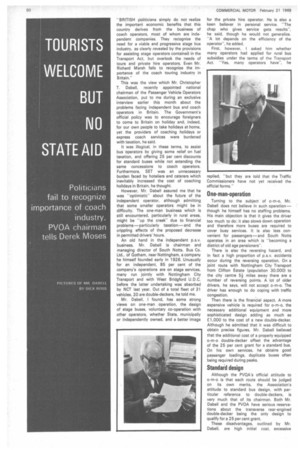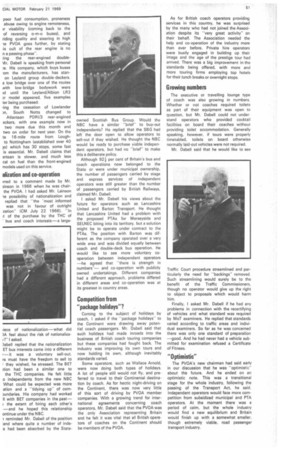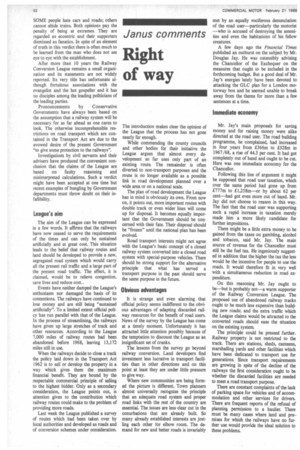TOURISTS WELCOME BUT NO STATE AID
Page 52

Page 53

Page 54

If you've noticed an error in this article please click here to report it so we can fix it.
BRITISH politicians simply do not realize the important economic benefits that this country derives from the business of coach operators, most of whom are independent companies. They recognize the need for a viable and progressive stage bus industry, as clearly revealed by the provisions for assisting stage operators contained in the Transport Act, but overlook the needs of tours and private hire operators. Even Mr. Richard Marsh fails to recognize the importance of the coach touring industry in Britain."
This was the view which Mr. Christopher T. Dabell, recently appointed national chairman of the Passenger Vehicle Operators Association, put to me during an exclusive interview earlier this month about the problems facing independent bus and coach operators in Britain. The Government's official policy was to encourage foreigners to come to Britain on holiday and, indeed, for our own people to take holidays at home, yet the providers of coaching holidays or express coach services were burdened with taxation, he said.
It was illogical, in these terms, to assist bus operators by giving some relief on fuel taxation, and offering 25 per cent discounts for standard buses while not extending the same concessions to coach operators.
Furthermore, SET was an unnecessary burden faced by hoteliers and caterers which inevitably increased the cost of coaching holidays in Britain, he thought.
However, Mr. Dabell assured me that he was -optimistic" about the future of the
independent operator, although admitting that some smaller operators might be in difficulty. The one-man business which is still encountered, particularly in rural areas, might be "up the creek" due to financial problems—particularly taxation—and the crippling effects of the proposed decrease in permitted drivers' hours.
An old hand in the independent p.s.v. business, Mr. Da bell is chairman and managing director of South Notts. Bus Co.
Ltd., of Gotham, near Nottingham, a company he himself founded early in 1926. Unusually for an independent, 85 per cent of the company's operations are on stage services, many run jointly with Nottingham City Transport and with West Bridgford U.D.C. before the latter undertaking was absorbed by NCT last year. Out of a total fleet of 31 vehicles, 20 are double-deckers, he told me.
Mr. Dabell, I found, has some strong views on one-man operation, the design of stage buses, voluntary co-operation with other operators, whether State, municipally or independently owned, and a better image for the private hire operator. He is also a keen believer in personal service "The chap who gives service gets results", he said, though he would not generalize. "A lot depends on the efficiency of the operator", he added.
First, however, I asked him whether many operators had applied for rural bus subsidies under the terms of the Transport Act. "Yes, many operators have", he
One-man-operation
Turning to the subject of 0-m-a, Mr. Dabell does not believe in such operation— though he himself has no staffing problems. His main objection is that it gives the driver too much to do: it also slows down operation and therefore more buses are required to cover busy services. It is also less convenient for passengers—and South Notts operates in an area which is "becoming a district of old age pensioners".
There is also the reversing hazard, and in fact a high proportion of p.s.v. accidents occur during the reversing operation. On a joint route with Nottingham City Transport from Clifton Estate (population 30,000) to the city centre 54 miles away there are a number of reversing points. A lot of older drivers, he says, will not accept o-m-o. The driver has enough to do coping with traffic congestion.
Then there is the financial aspect. A more expensive vehicle is required for o-m-o, the necessary additional equipment and more sophisticated design adding as much as £1,000 to the cost of a new double-decker. Although he admitted that it was difficult to obtain precise figures, Mr. Dabell believed that the additional cost of a properly equipped 0-m-a double-decker offset the advantage of the 25 per cent grant for a standard bus. On his own services, he obtains good passenger loadings, duplicate buses often being required during peaks.
Standard design
Although the PVOA's official attitude to o-m-o is that each route should be judged on its own merits, the Association's attitude to standard bus design, with particular reference to double-deckers, is very much that of its chairman. Both Mr. Dabell and the PVOA have serious reservations about the transverse rear-engined double-decker being the only design to qualify for a 25 per cent grant.
These disadvantages, outlined by Mr. Dabell. are high initial cost, excessive
poor fuel consumption, proneness abuse owing to engine remoteness, visability (coming back to the of reversing o-m-o buses), and riding quality and steering in high ie PVOA goes further, by stating is cult of the rear engine is no
n a passing phase".
:ing the rear-engined doubleVlr. Dabell is speaking from personal :e. His company, which buys buses .om the manufacturers, has stanon Leyland group double-deckers. a low bridge over one of the routes with low-bridge bodywork were t.c:1 until the Leyland/Albion LR3 .?,r model appeared, five examples ter being purchased.
,ing the cessation of Lowlander )n, South Notts changed to
Atlantean PDRI/3 rear-engined eckers, with one example now in two more due this month and two on order for next year. On the te 16-mile route from Loughto Nottingham (established over 40 jo) which has 30 stops, some fast is essential. Mr. Dabell claims that mtean is slower, and much less cal on fuel than the front-engined models used on this service.
alization and co-operation :rred to a comment made by Mr. 3inson in 1966 when he was chairthe PVOA. I had asked Mr. Lainson le possibility of nationalization and replied that "the 'most informed was not in favour of outright zation" (CM July 22 1966). "In of the purchase by the THC of bus and coach interests—a large
liece of nationalization—what did )A feel about the risk of nationalize'?" I asked.
)abell replied that the nationalization ET bus interests came into a different — it was a voluntary sell-out. rs must have the freedom to sell to they wished, he stressed. The BET lion had been a similar one to the THC companies. He felt little
o independents from the new NBC What could be expected was more ation and a "tidying up" of corn)undaries. His company had worked II with BET companies in the past) the extent of hiring each other's —and he hoped this relationship ontinue under the NBC.
reminded Mr. Dabell of the position and where quite a number of indes had been absorbed by the State
owned Scottish Bus Group. Would the NBC have a similar "brief" to buy-out independents? He replied that the SBG had left. the door open to allow operators to sell-out if they wished. He thought the NBC would be ready to purchase viable independent operators, but had no "brief" to make this a deliberate policy.
Although 921 per cent of Britain's bus and coach operations now belonged to the State or were under municipal ownership, the number of passengers carried by stage and express services of independent operators was still greater than the number of passengers carried by British Railways, claimed Mr. Dabell.
I asked Mr. Dabell his views about the future for operators such as Lancashire United and Barton Transport. He thought that Lancashire United had a problem with the proposed PTAs for Merseyside and SELNEC biting into its territory, but a solution might be to operate under contract to the PTAs. The position with Barton was different as the company operated over a very wide area and was divided equally between coach and double-deck bus operation. He would like to see more voluntary cooperation between independent operators —he agreed that "there is strength in numbers"— and co-operation with publicly owned undertakings. Different companies had a different approach, problems differed in different areas and co-operation was at its greatest in country areas.
Competition from package holidays"?
Coming to the subject of holidays by coach, I asked if the "package holidays" to the Continent were drawing away potential coach passengers. Mr. Dabell said that such holidays had made inroads into the business of British coach touring companies but these companies had fought back. The industry was improving its own tours and now holding its own, although inevitably standards varied.
Some operators, such as Wallace Arnold, were now doing both types of holidays. A lot of people still would not fly, and preferred to travel to their Continental destination by coach. As for hectic night-driving on the Continent, there was now very little of this sort of driving by PVOA member companies. With a growing trend for international agreements concerning coach operators, Mr. Dabell said that the PVOA was the only Association representing Britain and he felt it was vital that all British operators of coaches on the Continent should be members of the PVOA. As for British coach operators providing services in this country, he was surprised by the many who had not joined the Association despite its "very great activity" on their behalf. The Association needed the help and co-operation of the industry more than ever before. Private hire operators were busily engaged in building up their image and the age of the prestige tour had arrived. There was a big improvement in the standards being offered, with more and more touring firms employing top hotels for their lunch breaks or overnight stops.
Growing numbers
The executive or travelling lounge type of coach was also growing in numbers. Whether or not coaches required toilets as part of their equipment was open to question, but Mr. Dabell could not understand operators who provided cocktail facilities on board their coaches without providing toilet accommodation. Generally speaking, however, if tours were properly timetabled, toilets on board otherwise normally laid-out vehicles were not required.
Mr. Dabell said that he would like to see Traffic Court procedure streamlined and particularly the need for "backings" removed. Such streamlining would surely be to the benefit of the Traffic Commissioners. though no operator would give up the right to object to proposals which would harm him.
Finally, I asked Mr. Dabell if he had any problems in connection with the recertifying of vehicles and what standard was required by MoT examiners. He replied that standards varied according to traffic areas and individual examiners. So far as he was concerned there was only one standard of preparation —good. And he had never had a vehicle submitted for examination refused a Certificate of Fitness.
"Optimistic"
The PVOA's new chairman had said early in our discussion that he was "optimistic" about the future. And he ended on an optimistic note. This was a transitional stage for the whole industry, following the passing of the Transport Act, he said. Independent operators would face more competition from subsidized municipal and PTA operators. At the moment there was a period of calm, but the whole industry would find a new equilibrium and Britain would finish up with a somewhat smaller, though extremely viable, road passenger transport industry.
SOME people hate cars and roads; others cannot abide trains. Both opinions pay the penalty of being at extremes. They are regarded as eccentric and their supporters dismissed as fanatics. In spite of an element of truth in this verdict there is often much to be learned from the man who does not see eye to eye with the establishment.
After more than 10 years the Railway Conversion League remains a small organization and its statements are not widely reported. Its very title has unfortunate although fortuitous associations with the evangelist and the hot gospeller and it has no disciples among the leading politicians of the leading parties.
Pronouncements by Conservative Governments have always been based on the assumption that a railway system will be necessary for as far ahead as one cares to look. The otherwise incomprehensible restrictions on road transport which are contained in the Transport Act are due to the avowed desire of the present Government "to give some protection to the railways".
Investigations by civil servants and their advisers have produced the convenient conclusion that the claims of the League are based on faulty reasoning and misinterpreted calculations. Such a verdict might have been accepted at one time but recent examples of bungling by Government departments must throw doubt on their infallibility.
League's aim The aim of the League can be expressed in a few words. It affirms that the railways have now ceased to serve the requirements of the times and can only be sustained artificially and at great cost. This situation leads to the belief that railway routes and land should be developed to provide a new, segregated road system which would carry all the present rail traffic and a large part of the present road traffic. The effect, it is claimed, would be to relieve congestion, save lives and reduce cost..
Events have neither damped the League's enthusiasm nor damaged the basis of its contentions. The railways have continued to lose money and are still being "sustained artificially". To a limited extent official policy has run parallel with that of the League. In the process of streamlining, the railways have given up large stretches of track and other resources. According to the League 7,000 miles of railway routes had been abandoned before 1968, leaving 13,172 miles still in use.
When the railways decide to close a track the policy laid down in the Transport Act 1962 is to sell or develop the property in a way which gives them the maximum financial benefit. They are bound by the respectable commercial principle of selling to the highest bidder. Only as a secondary consideration, the League points out, is attention given to the contribution which railway routes could make to the problem of providing more roads.
Last week the League published a survey of routes which had been taken over by local authorities and developed as roads and of conversion schemes under consideration.












































































































